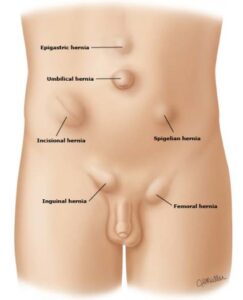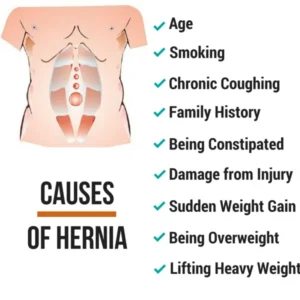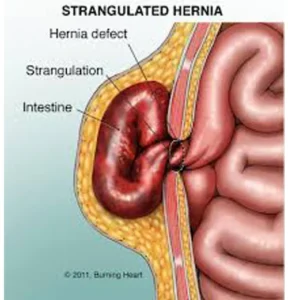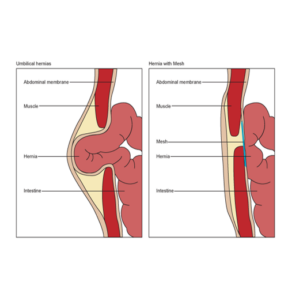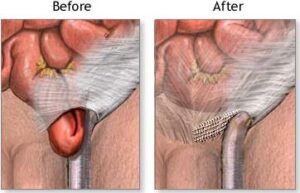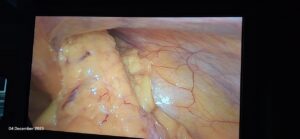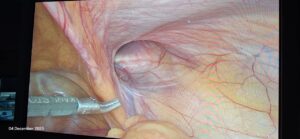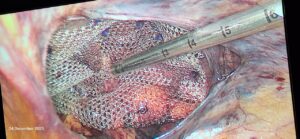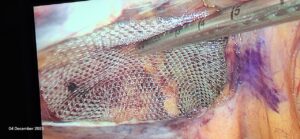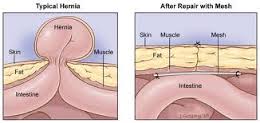Hernia Treatment
Hernia Treatment In Pune – Dr. Girish Bapat
Hernia: An Overview
A hernia is a gap or area within the sturdy tissue that holds muscle mass in place. A hernia takes place while the interior layers of the belly muscle have weakened, resulting in a bulge or tear.
In the same way that an internal tube pushes through a damaged tyre, the internal lining of the stomach pushes through the weakened area of the stomach wall to form a small balloon-like a sac.
This will reason a loop of gut or stomach tissue to push into the sac. A hernia can reason discomfort, severe ache, or different probably extreme troubles like strangulation that could require the emergency surgical procedure.
A hernia does now not get better over the years, nor will it cure itself. There are no exercises or physical therapy regimen or yoga that can make a hernia depart. You must visit a hernia specialist doctor/surgeon for hernia treatment.
How does a hernia present?
Depending on their vicinity, maximum hernia appears as a swelling, which can be painful. The swelling will often seem when you are straining or lifting something and disappear while you lie down and loosen up.
In few humans, they’ll present with bowel obstruction due to bowel getting trapped (strangulation) within a hernia, that is a clinical emergency which may be severe.
What are the causes of Hernia?
Both women and men can get a hernia. You may be born with a hernia (congenital) or expand one through the years.
Hernias in adults may additionally get up due to the stress which raises the pressure within the abdomen, inflicting a weak point or tear on the abdominal wall.
What are the Symptoms?
A hernia is commonly noticed after a pressure – as an example, after lifting a heavy item.
Sometimes you can genuinely notice a small lump, usually inside the groin region.
Usually, before everything, the lump can be pushed returned but may additionally pop out after straining once more. Coughing, lifting heavy items or extended status is a common strain that brings them out. The swelling often disappears when you lie down.
Contact A Hernia Specialist for hernia treatment in Pune, Kolhapur and Aurangabad
Hernias are not generally painful, however many humans experience pain over a hernia, which worsens after doing any activity. In time, they may turn out to be bigger as the gap of their muscle or ligament tissue turns into large.
If a hernia doesn’t lessen, will become crimson or painful, it has obstructed and is in danger of strangulation. It is an emergency and also you should contact a Hernia Doctor right now. We at Caloms, are having a group of properly skilled Hernia Specialist in Pune who gets you rid of your hernia.
The Caloms is designed in order that sufferers obtain individualized care, undergoing a complete assessment with a board-licensed doctor to determine the exceptional surgical treatment for his or her precise sort of a hernia, which allows avoiding recurrent hernias and complications.
- Laparoscopic Inguinal ( Groin ) Hernia
- Ventral Hernias ( Umbilical Hernia )
- Hiatus Hernia
Direct Inguinal Hernia
A hernia is usually noticed after a strain – as an example, after lifting a heavy object. Sometimes you may actually observe a small lump, usually in the groyne region. Usually, at first, the lump may be pushed returned however may additionally come out after straining again. Coughing, lifting heavy items or prolonged status is a commonplace stress that brings them out. The swelling frequently disappears when you lie down.
Indirect Inguinal Hernia
As the most common type of a hernia in men, an oblique hernia occurs when a loop the of the gut and/or fats presses into or thru the inguinal canal in the groyne place. This area can be weak at delivery, permitting hernias to shape later in life. Both women and men can get this kind of a hernia.
Incisional Hernia
This form of a hernia occurs via the scar from a past surgical procedure, especially after post-operative infections, chronic cough, obesity and so on. This type of a hernia can arise anywhere in the abdomen months or years after the surgical operation.
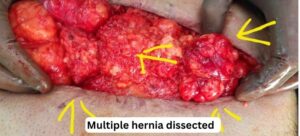
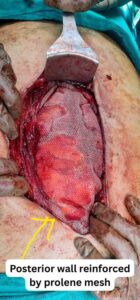
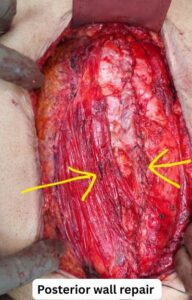
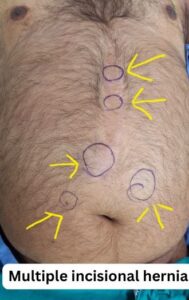
Umbilical Hernia
This hernia is visible in children and adults of each sex within the umbilical ring that surrounds the navel. It can be as a result of an illness this is present at the beginning or may arise over the years because of obesity, excessive coughing, or pregnancy.
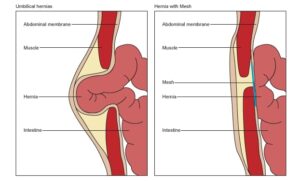
Hiatus Hernia
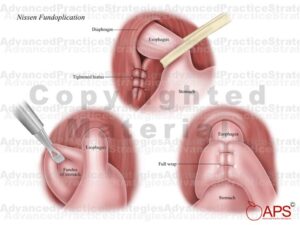
A hiatus hernia is associated with gastric reflux (GERD or GORD). For similarly data please talk to our segment on Gastric Reflux. At times, other terms are used to describe your hernia. If you have got hernias on each facet of your groyne, those are referred to as bilateral hernias.
If your hernia takes place in the equal spot as a previous hernia restore, it’s miles called a recurrent hernia.
F.A.Q
A person can do little to prevent areas of the abdominal wall from being weak or becoming weak, which can potentially become a site for a hernia. However, people can reduce the pressure on the abdominal wall to prevent a hernia from bulging through a weak spot (or prevent a hernia from becoming worse) by following these lifestyle practices:
• Lose weight if overweight.
• Eat high-fiber foods with plenty of whole grains and fruits and vegetables to prevent constipation and straining with bowel movements. Drink plenty of water.
• Learn how to lift heavy objects or simply do not lift them at all.
• Stop smoking. Smoking can cause coughing, which can make a hernia worse.
• Exercise to strengthen the abdominal muscles.
How is Hernia Treated? There are no medications to treat a hernia directly. The doctor may prescribe medications to reduce the risk of worsening a hernia (such as a stool softener or cough medicine).
Hernia treatment depends on whether it is reducible or irreducible and possibly strangulated. Medically speaking, all hernias should be repaired to avoid the possibility of future intestinal strangulation (which is a serious complication) provided patient is fit to undergo surgery. These cases can be operated selectively. However, all acutely irreducible hernias need emergency treatment because of the risk of strangulation.
Hernias can be repaired with two types of surgery.
Open: During traditional or open hernia repair, the abdominal wall is opened during the operation, the protruding tissue is moved back into the abdomen, and the abdominal wall is closed and the weak area reinforced with synthetic mesh. The operation can be performed under local or general anesthesia. The person will have an incision and several stitches. The patient will have to stay in the hospital for a couple of days.
Laparoscopy: These days most of the hernia surgeries are done by laparoscopy or keyhole technique. With laparoscopy, tiny fiber-optic instruments are inserted into the abdomen through small surgical openings. The person may have three small incisions ( about 5-10 mm long). A video camera is inserted into one opening, which guides the surgeon who is manipulating the instruments in the other two openings.
A synthetic mesh or a three dimensional (3-D) mesh is introduced, positioned and fixed to the inside of the defect. The person is given general anesthesia, so he or she is asleep during the procedure.
– Advantages of Laparoscopic Surgery:
– Shorter recovery
– Less invasive
– Less pain
– Early mobilization
Early resumption of activities like walking, driving.
– Back to work early
– Early discharge
Recovering from hernia repair
You should be able to go home 1-2 days after your operation. Get an adult to take you home in a car or taxi and follow any instructions you are given by the hospital.
After the operation, your operation site will feel sore and uncomfortable. You will be given painkillers to help relieve this discomfort.
Looking after yourself
An adult must stay with you for the first 24 hours after your operation in case you experience any problems. If you are still in pain after going home, continue taking painkillers as advised by the hospital. Make sure you follow the instructions your doctor gave you about caring for your wound, hygiene, and bathing before you left the hospital. Straining on the toilet because of constipation can cause pain around your wound. You can reduce your risk of constipation by drinking lots of fluids and eating plenty of vegetables, fruit, and high-fiber foods. A mild laxative may also help.
Activities
If the operation was carried out under a general anesthetic (which puts you to sleep during your operation), your coordination and reasoning may be affected for a short time. You should avoid drinking alcohol, operating machinery or signing legal documents for at least 48 hours after any operation involving general anesthetic.
Over time, you can gradually return to your normal activities as soon as you are able to do them without feeling any pain. Most people are able to do light activities, such as shopping, after one or two weeks. You should also be able to return to work after one or two weeks, although you may need more time off if your job involves manual labour. Gentle exercise, such as walking, can help the healing process, but you should avoid heavy lifting and strenuous activities for about 4-6 weeks.
You may find sex painful or uncomfortable at first, but it is usually fine to have sex when you feel like it.
Driving
Speak to the doctor in charge of your care for advice about when you can drive. It is usually advisable to avoid driving until you are able to perform an emergency stop without feeling any pain or discomfort (you can practise this without starting your car). It will usually be one or two weeks before you reach this point after having keyhole surgery, although it may take longer after open surgery.
It is usually recommended that you contact your car insurance company before starting driving again.
When to call the doctor
Call your surgeon if you develop any of the following symptoms:
• persistent fever over 38°C (100.4°F)
• bleeding
• increased swelling or pain in your abdomen
• pain that is not relieved by painkillers
• persistent nausea or vomiting
• chills
• persistent coughing or shortness of breath
• increasing redness surrounding your incisions
• difficulty passing urine
Hernia surgery is generally safe and complications are rare, however as with other surgeries there is a small chance of risks which include:
– Bleeding
– Infection
– Long term pain (common in open surgery)
– A scar
– Injury to organs (such as the intestines, bladder, or others)
– Risks of general anesthesia, such as pneumonia or blood clots, although these risks are rare
Preoperatively, we do thorough investigations to ascertain fitness of the patient.
Cost depends on lots of factors such as
• Bed category
• Mesh type, size
• Open or laparoscopic repair
• Choice of hospital etc
• Preexisting medical conditions such as diabetes, angina which may prolong your hospital stay or need critical monitoring.
Following your first meeting with the doctor, we would be able to give you an approximate estimate.
We like to see you 10 days after the operation to check on your progress and wounds. Please call the doctor to fix an appointment.

